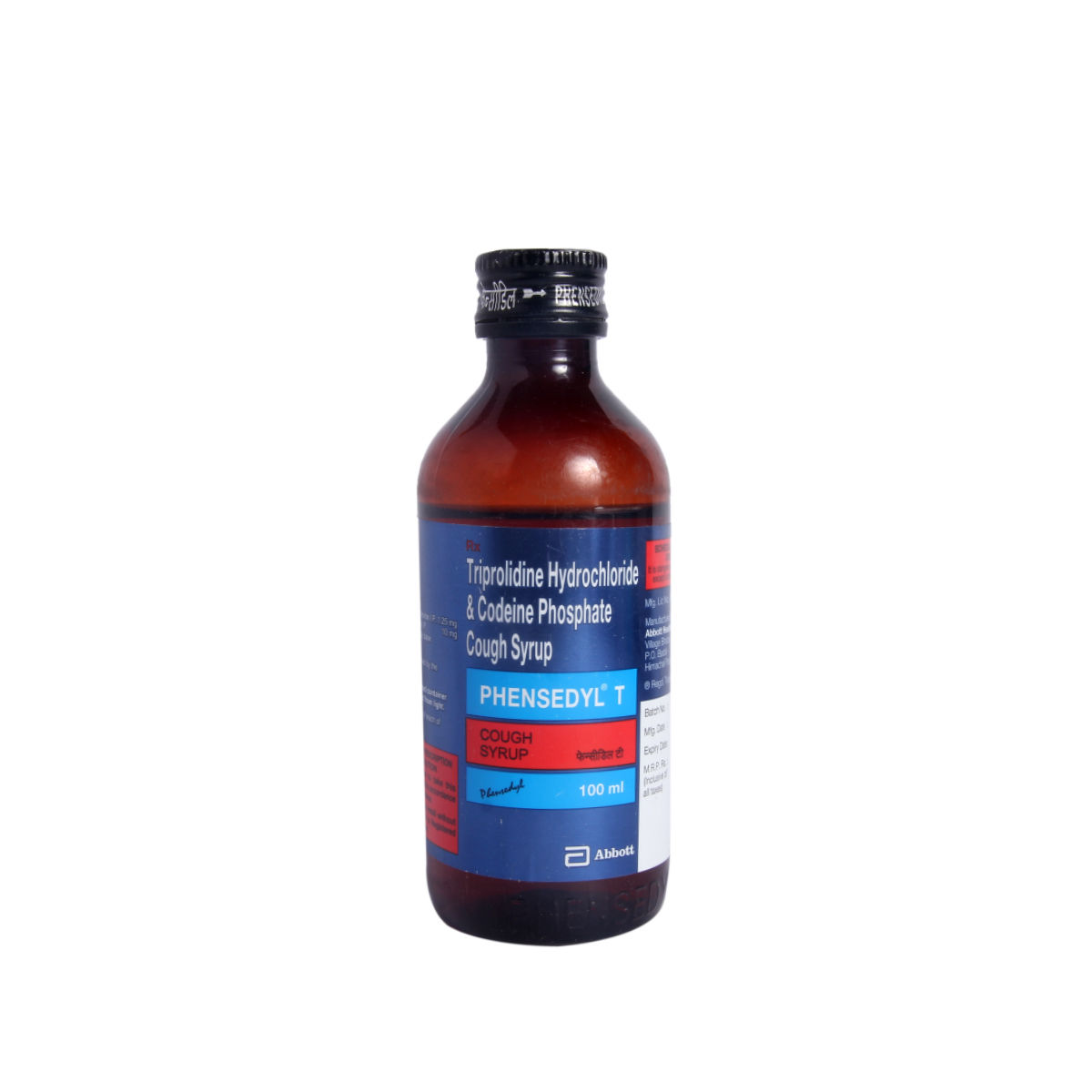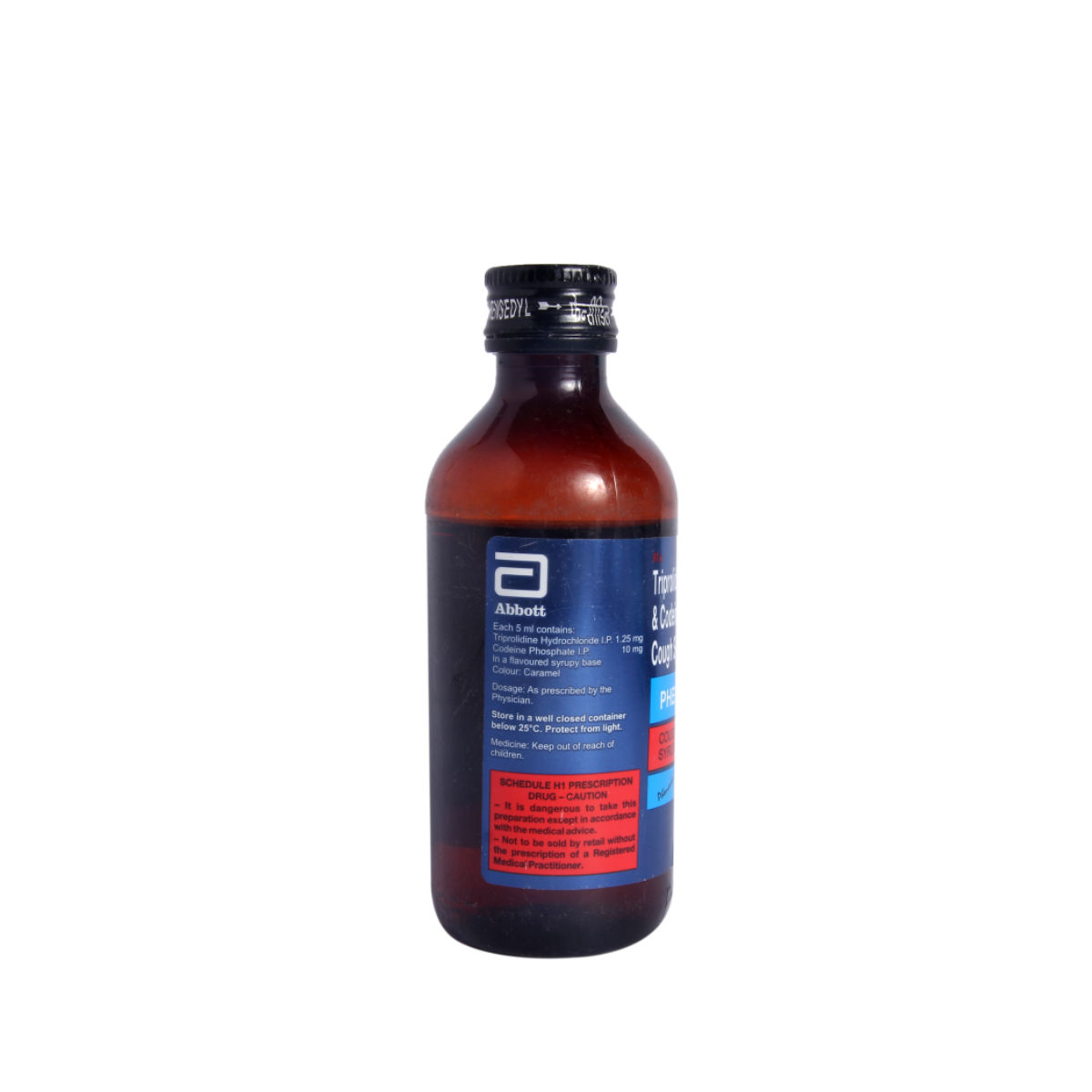Phensedyl T Syrup 100 ml
₹167.9*
MRP ₹186.5
10% off
₹155.75*
MRP ₹186.5
15% CB
₹30.75 cashback(15%)
Free Delivery
With Circle membership
(Inclusive of all Taxes)
This offer price is valid on orders above ₹800. Apply coupon PHARMA10/PHARMA18 (excluding restricted items)
Know Your Delivery Time
Provide Delivery Location



Whats That

Secure Payment

India's Most Trusted Pharmacy

Genuine Products
Composition :
Manufacturer/Marketer :
Consume Type :
Return Policy :
Expires on or after :
About Phensedyl T Syrup
Phensedyl T Syrup belongs to a class of medication called ‘cough and cold preparations’ primarily used to treat dry cough associated with a common cold or upper respiratory allergies. Coughing (dry or productive) is the body’s way of clearing irritants (like allergens, mucus, or smoke) from airways and preventing infection. There are two types of coughs: Dry cough and chesty cough. A dry cough is tickly and doesn't produce any vicious or thick mucus, while a chesty cough (wet cough) means mucous or sputum is produced to help clear your airways.
Phensedyl T Syrup is a combination of two drugs: Codeine (cough suppressant) and Triprolidine(antihistamine). Codeine belongs to the class of cough suppressants that blocks the μ-opioid receptor in the brain that produces cough, thereby decreasing the urge to cough. Triprolidine belongs to the class of antihistamines (anti-allergic drugs) that works by blocking the action of histamine, a substance responsible for causing allergic reactions.
Take Phensedyl T Syrup as prescribed by your doctor. Take Phensedyl T Syrup for as long as your doctor has prescribed it for you, depending on your medical condition. In some cases, you may experience certain side effects, including drowsiness, dry mouth, vomiting, blurred vision, constipation, dizziness, or tiredness. Most of these side effects of Phensedyl T Syrup do not require medical attention and gradually resolve over time. However, if the side effects persist or worsen, please consult your doctor.
Please tell your doctor if you are allergic to Phensedyl T Syrup or any other medicines. Drink plenty of fluids while taking Phensedyl T Syrup to loosen mucus and protect yourself from being dehydrated or overheated during exercise. In hot weather, as Phensedyl T Syrup contains Triprolidine, it decreases sweating and increases heatstroke risk. Do not take Phensedyl T Syrup if you are pregnant or breastfeeding, as it may cause adverse effects on the baby. Phensedyl T Syrup is not recommended for children below 18 years of age. Do not take Phensedyl T Syrup if you have taken an MAO inhibitor (anti-depressant medication like Isocarboxazid, Phenelzine, Selegiline, and Tranylcypromine) in the last 14 days, as it may cause life-threatening drug interaction. Phensedyl T Syrup is a habit-forming drug, and hence there is a risk of dependence on Phensedyl T Syrup . So, before stopping Phensedyl T Syrup , contact a doctor as it may cause withdrawal symptoms like anxiety, increased heart rate, tremors, or general unwell feelings.
Uses of Phensedyl T Syrup
Medicinal Benefits
Phensedyl T Syrup is a combination of two drugs: Triprolidine and Codeine. Triprolidine belongs to the class of antihistamines (anti-allergic drugs) that works by blocking the action of histamine, a substance responsible for causing allergic reactions. It helps provide relief from allergy symptoms such as sneezing, running nose, watery eyes, itching, swelling, congestion, or stiffness. Codeine belongs to the class of narcotic cough suppressants that block the μ-opioid receptor in the brain that produces cough, thereby decreasing the urge to cough. Phensedyl T Syrup is used to treat cough associated with a common cold or upper respiratory allergies.
Side Effects of Phensedyl T Syrup
- Dizziness/Drowsiness
- Mood changes
- Tiredness/weakness
- Nausea and Vomiting
- Increased heartbeat
- Loss of appetite
- Headache
- Blurred vision
- Dry mouth
- Constipation
- Urinary retention
- Coordination problems
Directions for Use
Storage
Drug Warnings
Please tell your doctor if you are allergic to Phensedyl T Syrup or any other medicines. Do not take Phensedyl T Syrup for a prolonged time, Phensedyl T Syrup contains codeine that may lead to mental or physical dependence on Phensedyl T Syrup . Do not take Phensedyl T Syrup if you are pregnant or breastfeeding, as it may cause adverse effects on the baby. Phensedyl T Syrup is not recommended for children below 18 years of age. Do not use this medicine if you have used an MAO inhibitor in the past 14 days, as a dangerous drug interaction could occur. Phensedyl T Syrup should be taken with extreme caution in patients who have a history of alcoholism or drug abuse. Drink plenty of fluids while taking Phensedyl T Syrup to loosen mucus and protect yourself from being dehydrated or overheated during exercise. In hot weather, as Phensedyl T Syrup contains Triprolidine, it decreases sweating and increases heatstroke risk. If you have high blood pressure, fits, glaucoma, hyperthyroidism (overactive thyroid), chronic bronchitis, asthma, cough with mucus, cough caused by smoking, chronic bronchitis or emphysema (a lung condition causing shortness of breath), chronic obstructive pulmonary disease (COPD), blockage in stomach or intestines, kidney, liver, heart or urinary problems, inform your doctor before taking Phensedyl T Syrup .
Therapeutic Class
Drug-Drug Interactions
Drug-Food Interactions
Diet & Lifestyle Advise
- Avoid dairy products such as milk as they may increase mucus production. Also, avoid processed or refined foods to have relief from cough. Instead, replace baked foods, fried foods, white bread, white pasta, French fries, sugary desserts, and chips with green leafy vegetables.
- Drink plenty of fluids to avoid dry throat while you cough and loosen mucus.
- Avoid citrus fruits as they may worsen the cough. Eat fruits rich in water content, such as pears, watermelon, peaches, and pineapples.
Habit Forming
How Phensedyl T Syrup Works
What if I have taken an overdose of Phensedyl T Syrup
Alcohol
Unsafe
Avoid consumption of alcohol with Phensedyl T Syrup as it may increase the risk of drowsiness and other adverse effects.
Pregnancy
Unsafe
Phensedyl T Syrup is not recommended for use during pregnancy. Phensedyl T Syrup can have some harmful effects on the baby (fetus). Please consult your doctor. Your doctor will weigh the benefits and potential risks before prescribing it.
Breast Feeding
Unsafe
Phensedyl T Syrup may be excreted in breast milk and cause harm to your infant. Therefore, Phensedyl T Syrup should not be used while breastfeeding without a doctor’s advice.
Driving
Unsafe
Phensedyl T Syrup may cause dizziness, drowsiness, blurred vision, or impaired thinking in some people. Therefore, drive only if you are alert after taking Phensedyl T Syrup .
Liver
Caution
Take Phensedyl T Syrup with caution, especially if you have a history of liver diseases/conditions. The dose may be adjusted by your doctor if required.
Kidney
Caution
Take Phensedyl T Syrup with caution, especially if you have a history of kidney diseases/conditions. The dose may be adjusted by your doctor as required.
Children
Unsafe
Phensedyl T Syrup is not recommended for children below 18 years of age.
Country of origin
Manufacturer/Marketer address
Author Details
We provide you with authentic, trustworthy and relevant information
FAQs
Disclaimer
Product Substitutes









